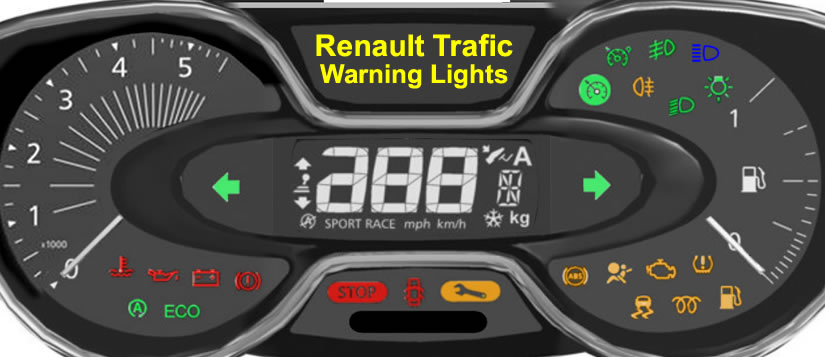Renault Trafic Dashboard Warning Lights
Detailed below are the dashboard warning lights for the Renault Trafic commercial van. The Renault Trafic van has been in production since 1980 and is now on its third generation. These warning lights primarily focus on the third generation (X82) but may apply to other versions.
Each warning light symbol has an explanation along with the recommended course of action to take based on the Renault’s guidelines. Red warning lights typically indicate a critical fault that requires immediate attention. Amber warning light indicate one of the following:
- A maintenance issue
- A minor fault
- A vehicle system has been manually deactivated when by default, it’s usually on
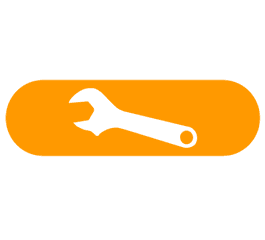 Fault Warning Light
Fault Warning Light
The Renault Trafic spanner warning light comes on in amber to indicate a fault. The spanner warning light may come on along with other warning lights, warning messages and alert the driver via an audible beep. If the spanner light comes on while driving, have the van serviced right away to avoid potential damage. In general, the spanner warning light indicates a fault that’s not critical, meaning you can continue driving the vehicle.
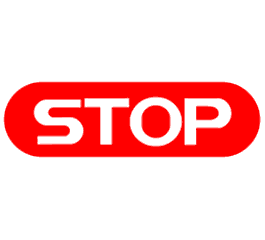 Stop Warning Light
Stop Warning Light
The Renault Trafic stop warning light comes on in red to indicate a critical fault. The stop warning light may come on along with other warning lights, warning messages and alert the driver via an audible beep. If the stop warning light comes on while driving, pull off the road as soon as it’s safely possible and switch off the engine. The stop warning light illuminates due to a critical fault that may affect your safety.
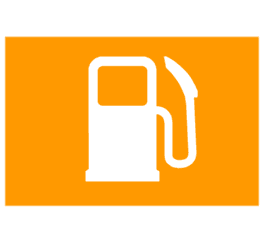 Low Fuel Warning Light
Low Fuel Warning Light
The low fuel warning light illuminates when there is only approximately 31 miles (50 km) worth of fuel left in the tank.
 Airbag Warning Light
Airbag Warning Light
The airbag warning light should illuminate when the ignition is switched on and should go out once the engine has started. If the Renault Trafic airbag warning light fails to illuminate with the ignition or remains lit after engine start, there’s a problem with the system. Common faults for the airbag light coming on include:
- Sensor fault – usually following a light collision
- Worn click spring inside steering wheel
- Seatbelt buckle switch
- Wiring under seats becomes dislodged
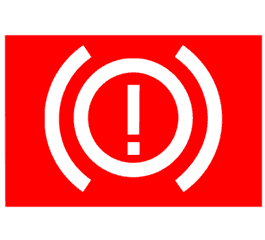 Brake Warning Light
Brake Warning Light
If the Renault Trafic brake warning light illuminates along with the red stop light ![]() , it’s indicating either that there is insufficient brake fluid in the brake circuit, or that there’s a fault with the braking system. Safely stop as soon as conditions allow and check brake fluid levels. Sometimes low brake pads along with an already low brake fluid level can trigger the brake warning light, or there’s a leak in the brake circuit. It’s advised that you do not continue driving and have the brake system inspected.
, it’s indicating either that there is insufficient brake fluid in the brake circuit, or that there’s a fault with the braking system. Safely stop as soon as conditions allow and check brake fluid levels. Sometimes low brake pads along with an already low brake fluid level can trigger the brake warning light, or there’s a leak in the brake circuit. It’s advised that you do not continue driving and have the brake system inspected.
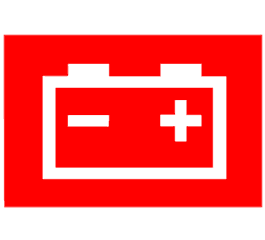 Battery Warning Light
Battery Warning Light
If the Renault Trafic battery warning light illuminates along with the red stop light ![]() , it means that’s there’s either an electrical overload in the charging circuit or a significant discharge. You may be able to continue driving for a short period of time, but continued driving may affect other systems that may cause safety issues. Common reasons for the brake warning light coming on include:
, it means that’s there’s either an electrical overload in the charging circuit or a significant discharge. You may be able to continue driving for a short period of time, but continued driving may affect other systems that may cause safety issues. Common reasons for the brake warning light coming on include:
- Old / failing battery
- Failing alternator
- Broken / loose alternator belt
- Corroded battery terminals or loose cables
- Loose ground strap
- Wiring issues
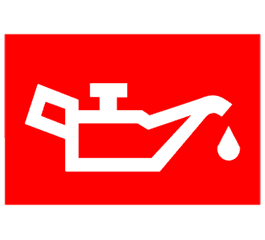 Oil Pressure Warning Light
Oil Pressure Warning Light
If the Renault Trafic oil pressure warning light comes on along with the red stop light ![]() , it’s essential that you pull off the road when safe to do so and switch off the engine. If engine oil pressure is low, it can cause disruption to the lubrication system, causing significant engine damage.
, it’s essential that you pull off the road when safe to do so and switch off the engine. If engine oil pressure is low, it can cause disruption to the lubrication system, causing significant engine damage.
Common causes for the low oil pressure light coming on is often low oil levels. Check oil level and top up if needed but only continue driving if the oil light goes off. Other reasons can include clogged oil filter, faulty oil pump or an internal oil leak. It can be reasonably common for the oil pressure sensor to be faulty and send inaccurate information.
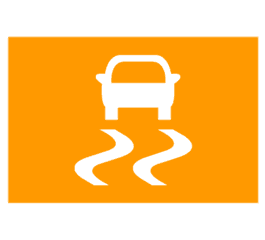 ESC Warning Light
ESC Warning Light
ESC (Electronic Stability Control) is a system that monitors and helps to reduce understeer and oversteer. ESC also works alongside traction control to reduce wheel slip. There are two possible reasons for the Renault Trafic ESC warning light to illuminate. Flashing means that ESC is operating to stabilize the van and permanently lit means there’s a fault with the system. Common reasons for the ESC fault light can include a problem with the wheels speed sensors and steering wheel angle sensor.
 Traction Control Warning Light
Traction Control Warning Light
As part of the ESC function, the van is equipped with traction, or grip control. There are various modes that can allow for differing road conditions. Select ‘standard road mode’ for normal driving conditions. Or press the switch on the dashboard interface to select ‘non-grip road mode’ if road conditions are soft, such as mud, snow, sand etc.
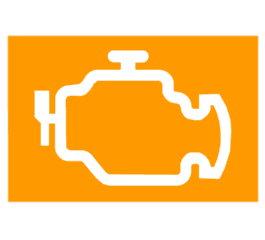 Engine Warning Light
Engine Warning Light
The Renault Trafic engine warning light can illuminate independently or with the spanner fault symbol ![]() . A message may also appear informing you to check antipollution system. For the engine warning light to illuminate, there are many potential faults that can trigger it. When the engine warning light illuminates, a fault code is usually stored in the van’s ECU.
. A message may also appear informing you to check antipollution system. For the engine warning light to illuminate, there are many potential faults that can trigger it. When the engine warning light illuminates, a fault code is usually stored in the van’s ECU.
Use diagnostic tools to read fault codes and diagnose the fault. For further information, see reasons why engine warning light is on. If the engine warning light begins to flash, gently reduce speed and avoid high engine loads until the engine light stops flashing. If the light continues to flash, there’s a risk of damage to the van’s catalytic converter.
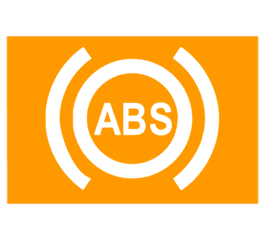 ABS Warning Light
ABS Warning Light
The Renault Trafic ABS warning light remains constantly lit with the Anti-lock Braking System has malfunctioned. ABS helps to increase stopping power by preventing the wheels from locking during hard braking. If the ABS fails, normal brakes will continue to work, but without the ABS feature. The most common causes of ABS failure can include the ABS module, but more common are the vulnerable wheel speed sensors, located one on each wheel.
 Reagent Warning Light
Reagent Warning Light
The Renault Trafic reagent warning light comes on along with a message indicating the remaining distance that can be travelled before AdBlue levels are exhausted. When AdBlue is exhausted and once the engine is switched off, the engine will no longer start until AdBlue levels are replenished. If the reagent warning light comes on along with the fault spanner symbol ![]() , it means there’s a fault with the system.
, it means there’s a fault with the system.
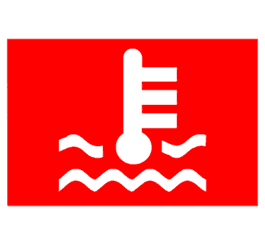 Coolant Warning Light
Coolant Warning Light
The Renault Trafic engine coolant warning light comes on due to the coolant overheating. The first thing that you should do is to safely pull off the road and switch off the engine. Allow engine to cool and check coolant levels. If coolant level is low, check for leaks around hoses, radiator and water pump. If coolant levels are fine and the engine does not appear to be overheating, it’s likely a sensor fault.
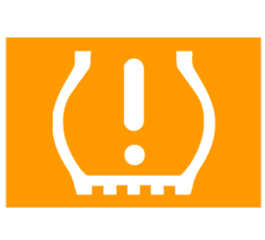 Tyre Pressure Warning Light
Tyre Pressure Warning Light
The Renault Trafic tyre pressure warning light comes to warn of a loss of pressure in one or more tyres. A warning message along with the stop warning ![]() if a puncture is detected. The warning may flash for around 60 seconds, then remain lit if there’s a fault with the tyre pressure monitoring system (TPMS). In this instance, a message will display along with the fault spanner symbol
if a puncture is detected. The warning may flash for around 60 seconds, then remain lit if there’s a fault with the tyre pressure monitoring system (TPMS). In this instance, a message will display along with the fault spanner symbol ![]() . Faults usually occur after a tyre change when sensors have not been installed correctly.
. Faults usually occur after a tyre change when sensors have not been installed correctly.
Renault Trafic Tyre Pressure Reset
The tyre pressure system should be reset after altering tyre pressures and ideally carried out when tyres are cold. To reset the Renault Trafic tyre pressure system:
- Switch on the ignition, but do not start the engine.
- Repeatedly press the either button on the end of the right-side steering column stalk and select Tyre Pressure Set.
- Press and hold for around 3 seconds to start the reset procedure.
- Confirmation that the reset procedure is being carried out by the message: Pressure Ref Ongoing.
- The tyre pressure reset procedure will be finalised after a few minutes of driving.
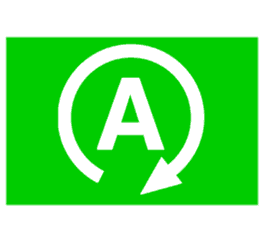 Engine Stop Start Warning Light
Engine Stop Start Warning Light
This green symbol indicates that the Renault Trafic engine has gone into standby as part of the engine start / stop system. The engine start stop system is automatically initiated with each ignition cycle.
Renault Trafic Engine Stop Start Not Working
There are several conditions that must be met before the standby will initiate. If the engine stop start is not working, it’s likely that one of these conditions have not been met. In this situation, you’ll see the following warning light illuminated: ![]() . The following conditions will prevent engine stop start from initiating:
. The following conditions will prevent engine stop start from initiating:
- The driver’s door is open or not properly closed.
- The driver’s seatbelt is not fastened.
- The van is in reverse gear.
- The bonnet is unlocked.
- The outdoor temperature is too high or too low.
- The battery has insufficient charge (most common reason).
- The difference between the automatic climate control setting and the vehicle interior temperature is too high.
- The altitude is too high.
- For vehicles fitted with an automatic gearbox, the gradient is too steep.
- The ‘Clear View’ function is activated on the automatic climate control.
- Engine temperature is too low.
- The diesel particulate filter (DPF) is being regenerated.
- The ‘Fast Idle Speed’ function has been activated.
